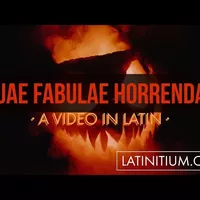#2 Halloween Special in Latin: Two ghost stories | Duae fabulae horrendae
Salvēte sodālēs.
Hodiē tractābimus terriculāmenta horrenda
quae ōlim, et fortasse, etiam nunc Stockholmiae fīunt.
Fuit ōlim monachus, nōmine Gideōn,
quī saeculō nōnō fuit.
Eī negōtium datum est
ut doctrīnam Chrīstiānam apud barbarōs (apud Suētōs)
propāgāret et dīvulgāret.
Cum Mare Balticum nāve suā relinqueret
ut intrāret lacum, cui nōmen est Meler,
naufragium factum est.
Hōc naufragiō factō, undīs iactātus est
et aquīs miser perīvit Gideōn.
Post mē cōnspicitis domum,
quae aedificāta est eō ipsō locō
quō corpus illīus monachī
ēiectum est in terram.
Et dīcitur etiam nunc, post tot saecula,
inambulāre et cōnspicī in hypogaeō sub terrā
huius ipsīus aedificiī.
Nūlla enim nox intercēdit quīn cōnspiciātur,
nūlla nox intercēdit, quīn exaudiātur ille miser Gideōn.
Nunc ante palātium lārvārum, vel, ante aulam lārvārum sumus.
Haec est domus tōtīus urbis Stockholmiae,
quae maximē ā lārvīs inquiētātur, īnfestātur, agitātur.
Nūlla alia domūs in hāc tōtā urbe
tot lārvās, tot. . .
tot phantasmata noctū patitur.
Aedificātum est, hoc aedificium,
ineunte saeculō duodēvīcēsimō.
Et vocātum est Schefflērī Palātium.
Sed iam ferē ducentōs annōs,
illud prīmum nōmen quod dīxī servat,
quod est, Palātium Lārvārum.
Prīmus dominus huius palātiī,
plānē ille quī vocātur Schefflērus,
dīcitur inclūsus esse pariete;
alius vērō dominus huius aedificiī, huius domūs,
dīcitur tam malignus, tam malus, tam improbus, tam nefandus fuisse
ut ipse diabolus venīret ut eum ad īnferōs sēcum dūceret.
Horrenda hīc fīunt.
Mediā enim nocte, audiuntur lārvae
quae rīdent, quae lacrimant, quae singultiunt.
Franguntur specula,
franguntur etiam fenestrae,
et in hōc hortō
maximē audiuntur ululātus fēminārum.
In ipsā domō
suā sponte quasi caecā aurā
extinguuntur flammae candēlārum.
Tantopere haec domus inquiētāta est lārvīs
ut sacerdōs adhibitus sit.
Arcessīvērunt igitur sacerdōtem
quī ēiceret, quī expelleret lārvās,
lemurēs ex hāc domō.
Tamen quid factum est?
Ille sacerdōs adiūrandō cōnātus est expellere hās lārvās,
sed ipse per fenestram ēiectus est.
Lārvae mānsērunt.
Sed multa et mīra hīc videntur facta esse,
nam, inter aliā,
annō mīllēsimō noncentesimō septimō
inventum est corpus mortuum,
effossum est
in hōc ipsō hortō.
Neque satis certum est quis fuerit,
neque quandō sepultus sit.
Sed illud vidētur certum:
eum esse ūnum ex eīs
quī etiam nunc hīc vagentur.
Vel, fortasse nōn.

